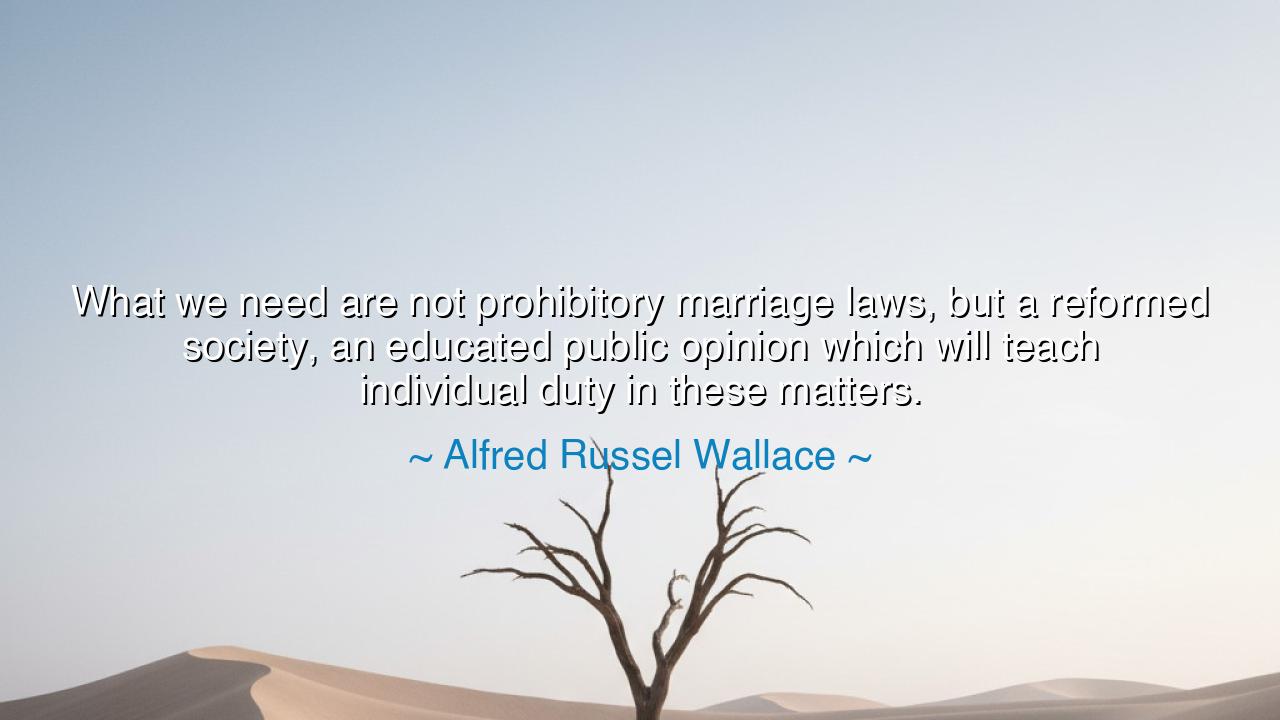
What we need are not prohibitory marriage laws, but a reformed
What we need are not prohibitory marriage laws, but a reformed society, an educated public opinion which will teach individual duty in these matters.






In the words of Alfred Russel Wallace, co-discoverer of the great law of natural selection, “What we need are not prohibitory marriage laws, but a reformed society, an educated public opinion which will teach individual duty in these matters.” These words ring not only as a commentary on his age, but as timeless counsel for all generations. Wallace reminds us that laws, though powerful, cannot alone sculpt the soul of a people. To forbid by command is to restrain the hand, but to reform by wisdom is to guide the heart.
The ancients knew this truth. Plato in his Republic declared that no state could stand firm unless its citizens were taught virtue from youth. He understood that laws are like fences—they can mark boundaries, but they cannot cultivate gardens. It is only through education and the shaping of the inner life that a society may endure. Wallace, speaking in the same spirit, warns us not to trust in prohibitory marriage laws to bring righteousness or stability. Instead, he calls for transformation through the raising of conscience, through duty born from knowledge and conviction.
History itself gives us proof. In the days of Emperor Augustus, Rome passed strict laws to regulate marriage and morality. Adultery was punished, marriages were arranged to strengthen families, and restrictions were placed upon unions. Yet these decrees did little to preserve Rome from moral decline. The heart of the people had not been reformed; they obeyed outwardly while inwardly mocking the statutes. The empire rotted from within, for law without virtue is a vessel without water, unable to quench the thirst of society.
Contrast this with the example of the early reformers in education, such as Johann Heinrich Pestalozzi. He believed that society would only flourish if children were taught from their earliest years the values of compassion, discipline, and responsibility. His schools did not rely on punishments and prohibitions, but on nurturing character and duty. From such seeds grew generations prepared not merely to follow laws, but to live by principles higher than the law itself. Here we see Wallace’s wisdom alive: a reformed society begins with the mind and the heart, not with chains and decrees.
Wallace also speaks of individual duty. For what is a society but the sum of its souls? If each man and woman neglects their responsibility, no law can mend the fabric of community. But if each one honors their duty—toward marriage, toward family, toward neighbor—then even without prohibitions, harmony may prevail. Duty is the silent law written within, deeper than any statute carved in stone. The ancients called it conscience; Wallace calls us back to it as the foundation of a just society.
The lesson, then, is clear: do not look only to rulers and lawmakers to solve the ills of marriage and morality. Instead, look inward and outward: inward, to cultivate virtue within yourself, and outward, to foster a culture of wisdom, compassion, and respect. A thousand laws cannot compel love between husband and wife, nor can they teach fidelity, patience, or sacrifice. But education, public opinion, and individual duty can shape these qualities into living realities.
Practical actions flow from this wisdom. Teach the young not only facts, but virtues—loyalty, respect, and compassion. Shape public discourse toward truth and dignity, so that honor is given not to wealth or spectacle, but to faithfulness and character. Examine your own duty in marriage and society, asking daily: have I contributed to the harmony of my household, the justice of my community, the strength of my nation? For when each soul takes responsibility, the whole fabric of society is renewed.
Thus Wallace’s words are not bound to his century but stand as eternal wisdom: what we need is not merely prohibitions, but transformation; not only the restraint of law, but the inspiration of conscience. Let future generations carry this teaching: that the greatness of a people lies not in the strictness of their laws, but in the depth of their virtue, their devotion to duty, and their unyielding pursuit of a society reformed in truth.






AAdministratorAdministrator
Welcome, honored guests. Please leave a comment, we will respond soon